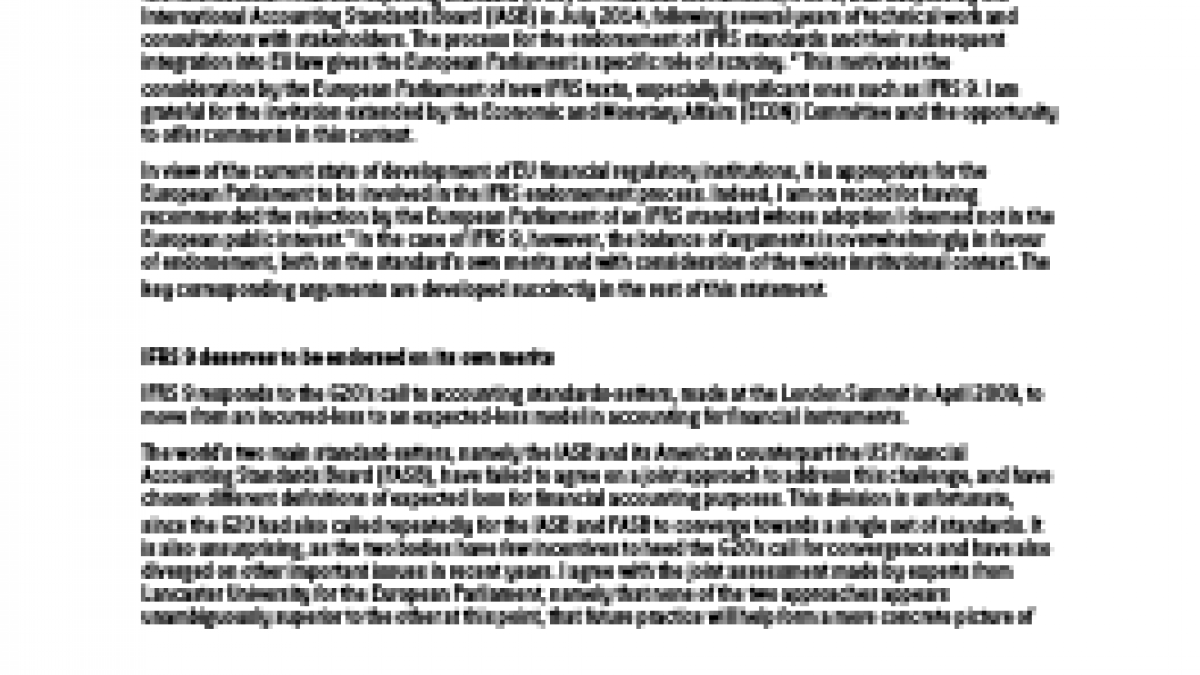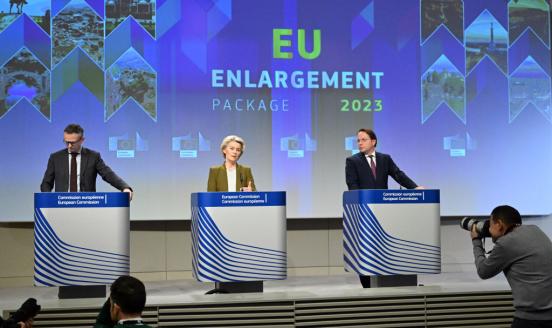EU Endorsement of the IFRS 9 Standard on Financial Instruments Accounting
Statement prepared for the European Parliament’s ECON Committee Public Hearing of 1 December 2015

The International Financial Reporting Standard (IFRS) on Financial Instruments, IFRS 9, was adopted by the International Accounting Standards Board (IASB) in July 2014, following several years of technical work and consultations with stakeholders. The process for the endorsement of IFRS standards and their subsequent integration into EU law gives the European Parliament a specific role of scrutiny. [2] This motivates the consideration by the European Parliament of new IFRS texts, especially significant ones such as IFRS 9. I am grateful for the invitation extended by the Economic and Monetary Affairs (ECON) Committee and the opportunity to offer comments in this context.
In view of the current state of development of EU financial regulatory institutions, it is appropriate for the European Parliament to be involved in the IFRS endorsement process. Indeed, I am on record for having recommended the rejection by the European Parliament of an IFRS standard whose adoption I deemed not in the European public interest.[3] In the case of IFRS 9, however, the balance of arguments is overwhelmingly in favour of endorsement, both on the standard’s own merits and with consideration of the wider institutional context. The key corresponding arguments are developed succinctly in the rest of this statement.
IFRS 9 deserves to be endorsed on its own merits
IFRS 9 responds to the G20’s call to accounting standards-setters, made at the London Summit in April 2009, to move from an incurred-loss to an expected-loss model in accounting for financial instruments.
The world’s two main standard-setters, namely the IASB and its American counterpart the US Financial Accounting Standards Board (FASB), have failed to agree on a joint approach to address this challenge, and have chosen different definitions of expected loss for financial accounting purposes. This division is unfortunate, since the G20 had also called repeatedly for the IASB and FASB to converge towards a single set of standards. It is also unsurprising, as the two bodies have few incentives to heed the G20’s call for convergence and have also diverged on other important issues in recent years. I agree with the joint assessment made by experts from Lancaster University for the European Parliament, namely that none of the two approaches appears unambiguously superior to the other at this point, that future practice will help form a more concrete picture of the differences between them in practice, and that the divergence between IASB and FASB does not justify a refusal by the EU to endorse IFRS 9.[4]
In their submissions to the European Financial Reporting Advisory Group (EFRAG) as part of the endorsement process, the European Banking Authority (EBA) and European Central Bank (ECB) have supported endorsement of IFRS 9 with consideration of the assumed benefits of the expected-loss model for financial stability. The European Securities and Markets Authority (ESMA) has similarly supported the standard’s endorsement.[5] Experts commissioned by the European Parliament have likewise recommended endorsement of IFRS 9, on grounds both of its expected contribution to financial stability[6] and of its compliance with the criteria set out in the IAS Regulation.[7] I concur with these assessments and the resulting recommendation of endorsement.
IFRS 9 has come under criticism from a group of UK-based investment professionals who have been more generally critical of the IASB for a number of years, with legal arguments centred on the notion of true and fair view and no reference to the actual content of the standard.[8] It is relevant to note that, in my experience, such criticism is not representative of the UK investor community as a whole, let alone the broader European investor community. Indeed, prominent European investor representatives have come up strongly in favour of endorsing IFRS 9 without delay.[9]
A specific concern related to IFRS 9 is its impact on the European insurance sector. A number of European insurers have complained about the fact that it might create a mismatch between accounting conventions for assets on the one hand and liabilities on the other hand, as long as the IFRS 4 standard on insurance liabilities remains unchanged.[10] This sector-specific concern was highlighted by EFRAG in its endorsement advice to the European Commission. It does not, as of itself, justify a delay in the endorsement of IFRS 9. Reactions from ESMA and from the CFA Institute, among others, include forceful arguments on why a deferral in the application of IFRS 9 by insurers would not be aligned with the interests of investors and the European public interest. ESMA’s letter notes pointedly in this respect that “EFRAG’s analysis seems to be mainly based on the representations received from the insurance industry (…) ESMA encourages EFRAG to undertake further work, in order to objectively assess both quantitative and qualitative evidence supporting the assertions in the draft letter.” [11]
Endorsement of IFRS 9 is justified in the broader context of the EU’s adoption of IFRS
Given the particular significance of IFRS 9, the decision on its endorsement will have implications in the broader context of the EU’s adoption of IFRS. This discussion relates to the debate on the governance of the IASB and its parent organization the IFRS Foundation, a debate which is as old as the IASB itself. A recurring theme is that the EU has insufficient influence in IFRS standard-setting.[12]
It is important to keep in mind here that IFRS represent a remarkable case of EU global leadership. Indeed, it is arguably the single most prominent example of the EU successfully leading the way in international financial reform in the past two decades, with its initial adoption of IFRS in 2005 followed by an increasing number of jurisdictions in the ensuing years. There can be little doubt that the IFRS Foundation would have struggled to achieve so much without the initial impetus provided by the EU, whose decision was formed at the political level in 2000 and enshrined in EU legislation in 2002. Against this background, the EU has a stake in the continued success of the IFRS project.
The EU must thus resist the potential temptation to use the process of endorsing individual standards, such as IFRS 9, to make statements or create leverage about the governance of the IFRS Foundation and the EU’s role therein. On the contrary, concerns about the integrity and reputation of both the IASB and the EU itself demand that discussions about individual standards be strictly separated from those about the standard-setting organization and its governance and funding arrangements. The heavy-handed pressure exerted by the EU in October 2008 to force the IASB to modify its then standard on financial instruments, IAS 39, in order to suit short-term interests of some European banks, provides a cautionary tale of questionable practice which has left deep scars and should not be repeated.
The governance of the IFRS Foundation is pioneering and experimental in nature, since no directly relevant precedent exists for this kind of standard-setting function at the global level, even though useful lessons can of course be learnt from other experiences. As such, this governance is intrinsically imperfect and can be improved. In particular, a better definition of the Foundation’s prevailing global stakeholders, a clearer framework of accountability vis-à-vis these, and a related overhaul of funding arrangements, appear desirable to this observer.[13] One should be under no illusions, however, that a simple fix might comprehensively address most governance concerns directed at the IFRS Foundation. Specifically, the notion of democratic accountability raises difficult questions when envisaged on a global scale, given the heterogeneity of political regimes across the world’s jurisdictions, including those that have adopted IFRS or substantially model their standards on them.
The issue of EU influence is separate from that of the IFRS Foundation’s governance, in which Europeans are certainly not underrepresented – to give only a few examples, the current chairman of the Foundation’s Trustees is French; the chairman of the IASB is Dutch; and its Vice Chair, while originally from New Zealand, also has a strong European background as former chairman of the UK Accounting Standards Board. To the extent that EU influence over IFRS is an issue, it is related to the fragmentation of mandates over accounting policy among different authorities. The European Commission has the leading role in IFRS endorsement; national authorities are charged with enforcing IFRS implementation by listed companies; and ESMA fosters cooperation and convergence in this area. By contrast, in most other jurisdictions, these functions are all performed by a single organization, e.g. the Financial Services Agency in Japan or the Securities and Exchange Commission in the US. Reform of relevant EU arrangements might be usefully considered in the new context created by the Capital Markets Union project.[14]
Conclusion
In the above-mentioned note to the ECON Committee on the endorsement of IFRS 8 in September 2007, I wrote: “In most advanced economies, it is not usually the role of Parliament to intervene directly in accounting standard-setting decisions. However, EU arrangements have given the European Parliament a voice in the IFRS adoption process. In my opinion, this voice should be used actively only in (hopefully) rare cases when all other actors in the chain of decision-making have failed to defend the objective of high-quality standards in the interests of users of financial information.” At the time, I concluded that such intervention was warranted in the case of IFRS 8, an opinion I still hold. I do not see, however, that a similar assessment can be made in the case of IFRS 9.
The EU should endorse IFRS 9 expeditiously. Separately, it should keep engaging with the IASB in the preparation of adequate follow-on adjustments in anticipation of the forthcoming review of insurance accounting.
[1] I am a Senior Fellow at Bruegel (Brussels) and a Visiting Fellow at the Peterson Institute for International Economics (Washington DC). I am also an independent board member of the derivatives trade repository arm of DTCC, a financial infrastructure company that operates on a not-for-profit basis, and in 2015-16 I work additionally as a consultant for the International Monetary Fund’s Independent Evaluation Office. In 2014 I represented Bruegel in the Informal Expert Group that supported the European Commission’s evaluation of Regulation (EC) 1606/2002, also known as the International Accounting Standards (IAS) Regulation. More complete information is available on www.bruegel.org.
[2] IAS Regulation (EC) 1606/2002, modified by Regulation (EC) 297/2008 which introduces the Regulatory Procedure with Scrutiny in the area of financial accounting standards.
[3] Nicolas Véron, “EU Adoption of the IFRS 8 Standard on Operating Segments”, Bruegel Policy Contribution, September 2007, based on the author’s participation in the ECON Committee hearing on this topic on 19 September 2007.
[4] John O’Hanlon, Noor Hashim and Weijia Li, “Accounting for Financial Instruments: The FASB and iASB IFRS 9 Approaches”, Study for the ECON Committee, European Parliament, September 2015.
[5] The corresponding letters are available on the EFRAG website: respectively http://www.efrag.org/files/IFRS%209%20endorsement/IFRS_9_DEA_-_CL44_-_EBA.pdf; http://www.efrag.org/files/IFRS%209%20endorsement/IFRS_9_DEA_-_CL45_-_ECB.pdf; and http://www.efrag.org/files/IFRS%209%20endorsement/IFRS_9_DEA_-_CL43_-_ESMA.pdf. See also Mario Draghi’s speech in London calling for swift EU endorsement of IFRS 9, 9 July 2014, available at https://www.ecb.europa.eu/press/key/date/2014/html/sp140709_2.en.html.
[6] Zoltan Novotny-Farkas, “The Significance of IFR 9 for Financial Stability and Supervisory Rules”, Study for the ECON Committee, October 2015
[7] Jannis Bischof and Holger Daske, “IFRS Endorsement Criteria in Relation to IFRS 9”, Study for the ECON Committee, October 2015.
[8] See e.g. comment letter from the UK Local Authority Pension Fund Forum, available on the EFRAG website at http://www.efrag.org/files/IFRS%209%20endorsement/IFRS_9_DEA_-_CL6_-_LAPFF.pdf.
[9] e.g. Eumedion letter to the ECON Committee on 30 November 2015, http://www.eumedion.nl/en/public/knowledgenetwork/letters/2015-11-ifrs-9-letter-to-ep-and-iasb.pdf.
[10] This issue is explored in more detail in an IASB staff paper of September 2015, available at http://www.ifrs.org/Meetings/MeetingDocs/IASB/2015/September/AP14-IFRS%209%20and%20IFRS%204.pdf.
[11] EFRAG endorsement advice letter to the European Commission of 15 September 2015 is at http://www.efrag.org/files/IFRS%209%20endorsement/IFRS_9_Final_endorsement_advice.pdf. The relevant letters of ESMA and the CFA Institute are respectively at http://www.esma.europa.eu/system/files/2015-1749_esma_comment_letter_to_efrags_draft_letter_to_the_european_commission_supplementing_its_endorsement_advice_on_adoption_of_ifrs_9.pdf and http://www.efrag.org/files/EFRAG%20public%20letters/IFRS%204%20IFRS%209/CL18_-_CFA_Institute.pdf.
[12] This theme was discussed at length in the report “Should IFRS Standards Be More ‘European’?” delivered by Philippe Maystadt to the European Commission in October 2013, available at http://ec.europa.eu/finance/accounting/docs/governance/reform/131112_report_en.pdf. See also Sebastian Botzem, “The European Union’s Role in International Economic Fora / Paper 7: The IASB”, Study for the ECON Committee, June 2015.
[13] See in particular Nicolas Véron, The Global Accounting Experiment, Bruegel Blueprint, April 2007; “Suggestions for Reforming the Governance of Global Accounting Standards”, Bruegel Policy Contribution 2011/04, May 2011; and “Keeping the Promise of Global Accounting Standards”, Bruegel Policy Brief 2011/05, July 2011.
[14] See specific recommendations in Nicolas Véron and Guntram Wolff, “Capital Markets Union: A Vision for the Long Term”, Bruegel Policy Recommendation 2015/05, April 2015, page 12.



